牛津2013届中考考前语法专练精讲(专题9_动词的时态与语态)
文档属性
| 名称 | 牛津2013届中考考前语法专练精讲(专题9_动词的时态与语态) |  | |
| 格式 | zip | ||
| 文件大小 | 141.2KB | ||
| 资源类型 | 教案 | ||
| 版本资源 | 通用版 | ||
| 科目 | 英语 | ||
| 更新时间 | 2013-04-25 11:44:05 | ||
图片预览

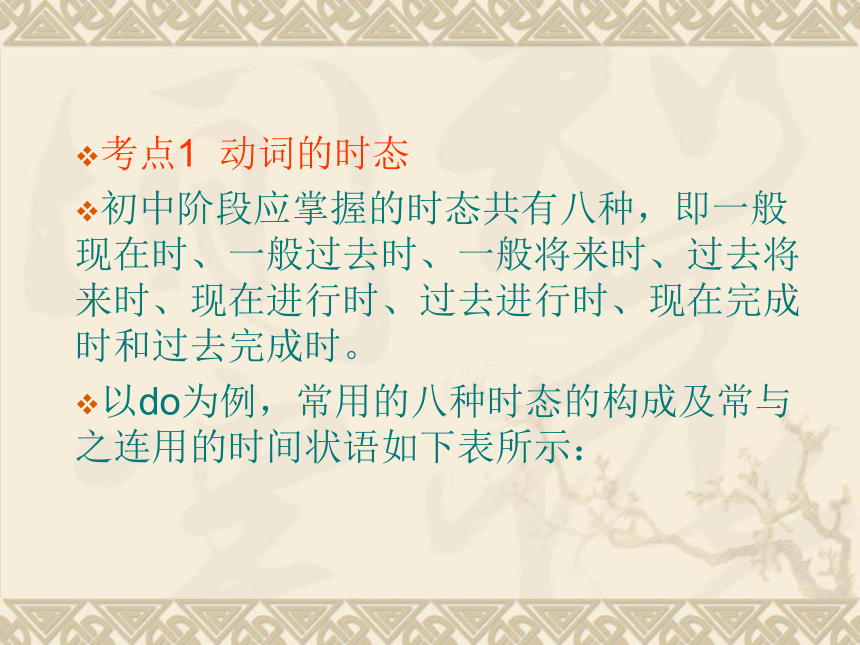
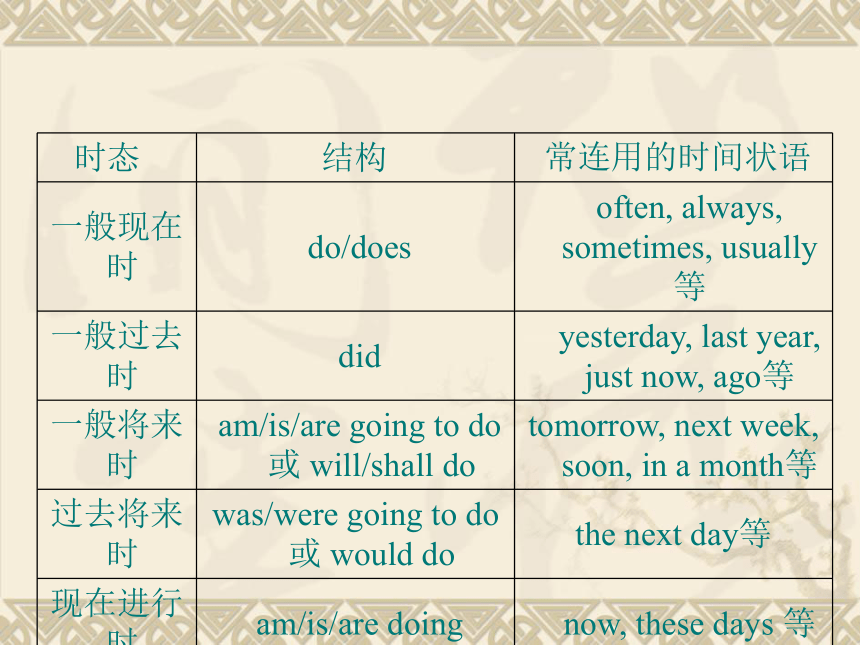
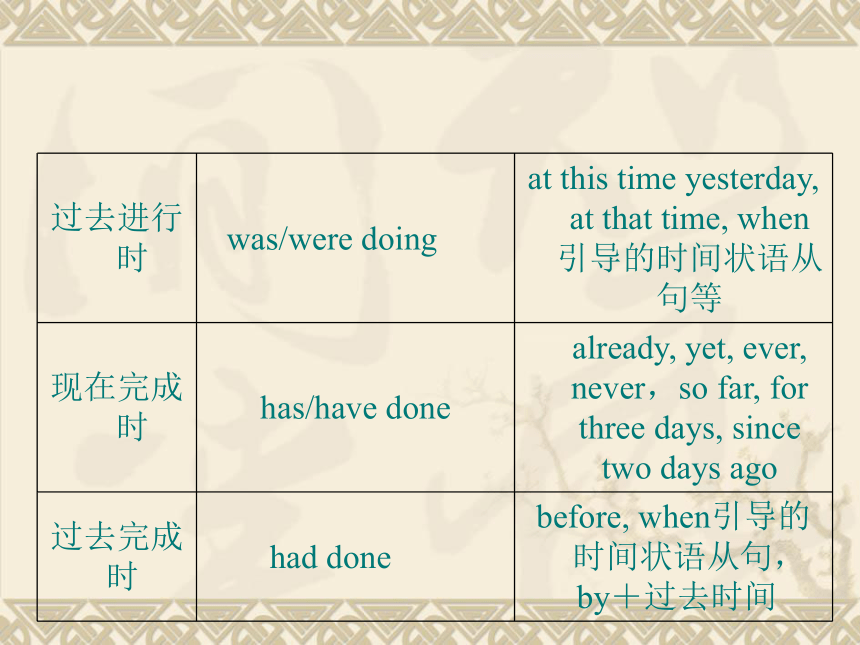
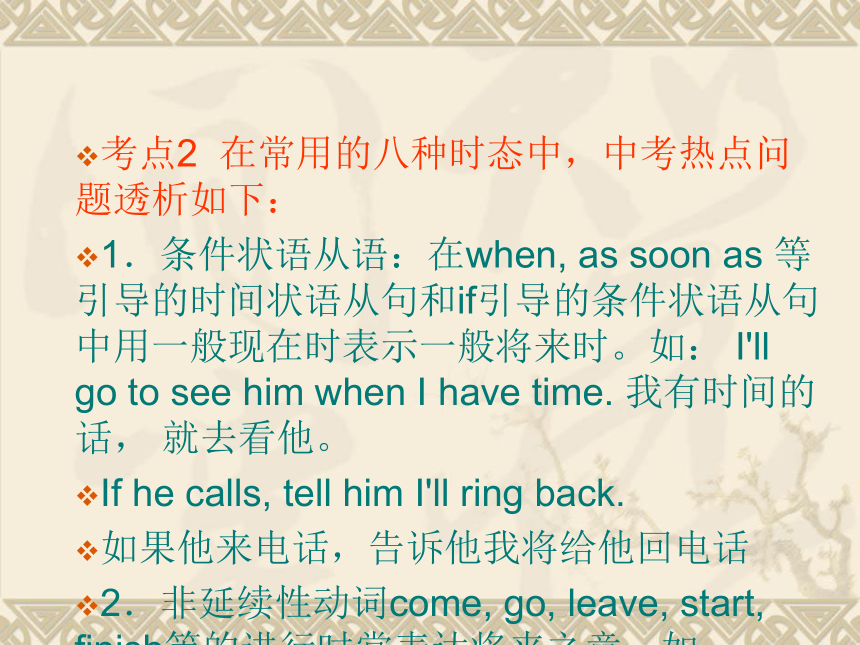
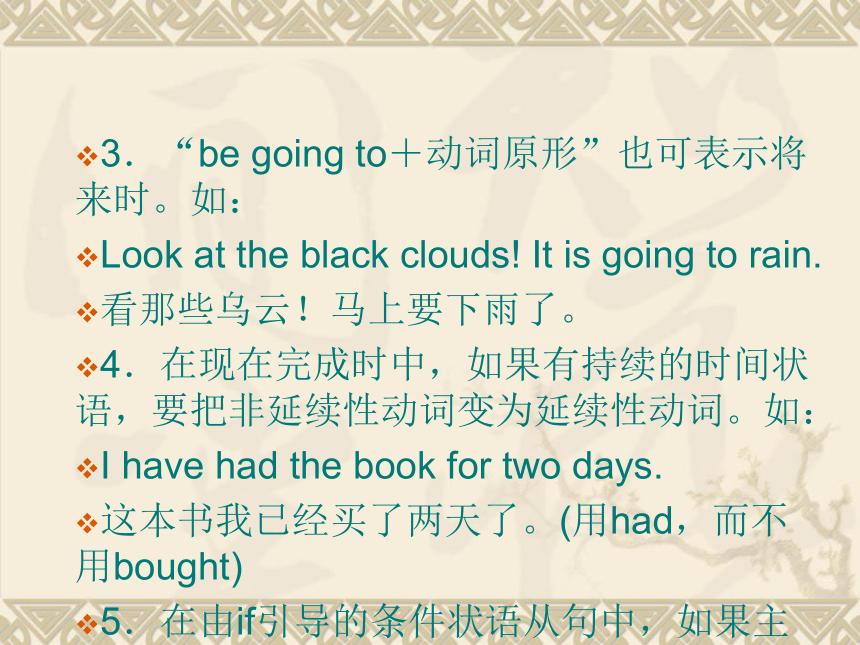
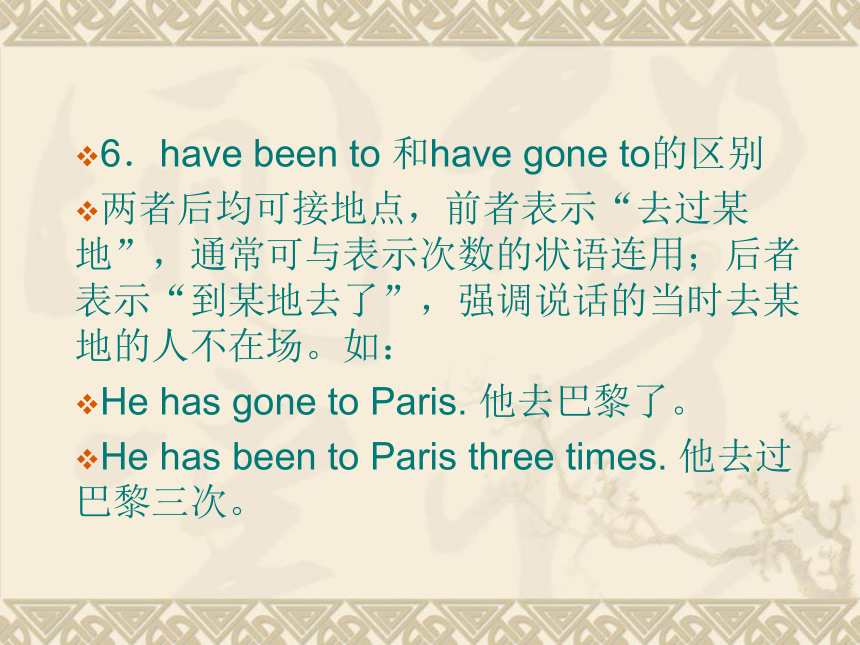
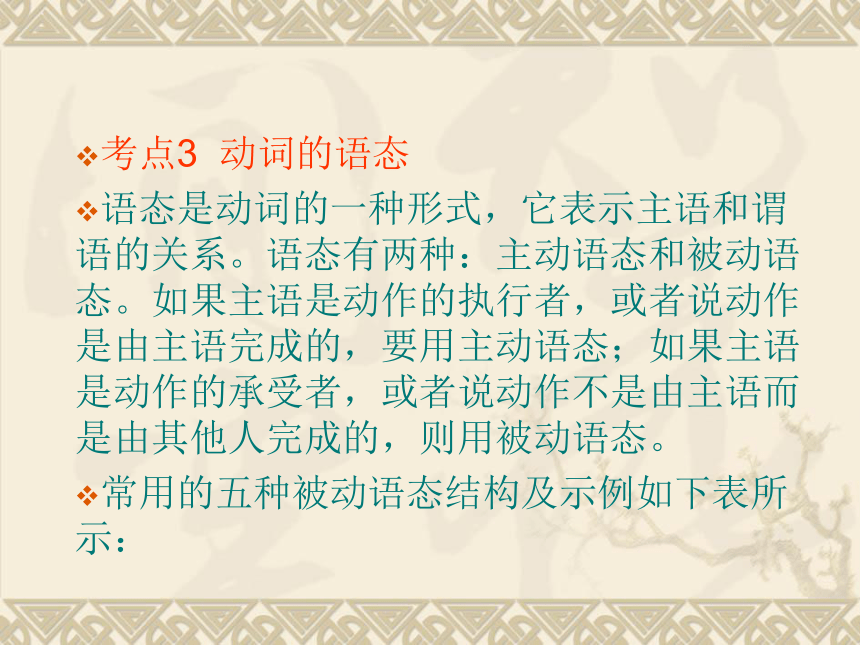
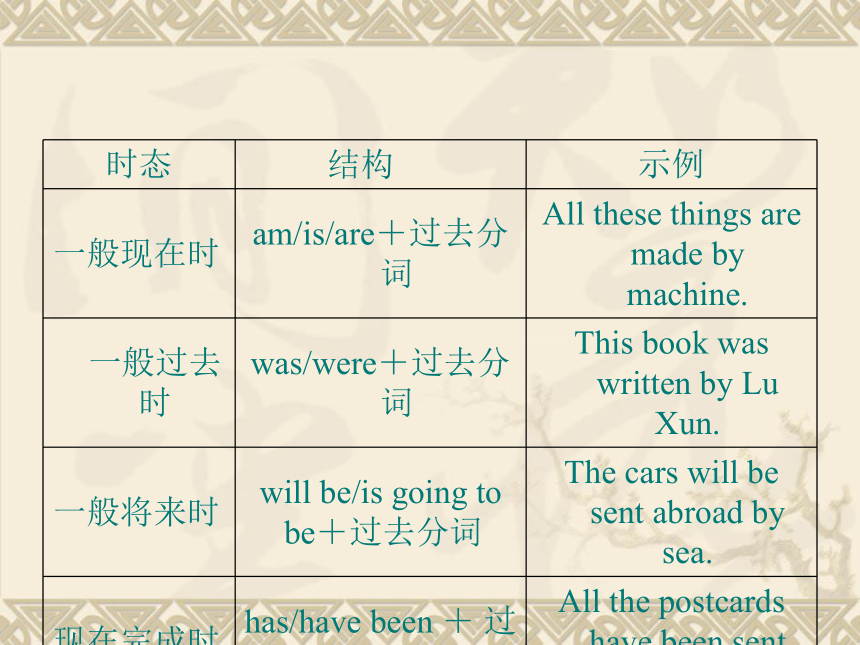
文档简介
课件20张PPT。专题九 动词的时态与语态 考点1 动词的时态
初中阶段应掌握的时态共有八种,即一般现在时、一般过去时、一般将来时、过去将来时、现在进行时、过去进行时、现在完成时和过去完成时。
以do为例,常用的八种时态的构成及常与之连用的时间状语如下表所示:考点2 在常用的八种时态中,中考热点问题透析如下:
1.条件状语从语:在when, as soon as 等引导的时间状语从句和if引导的条件状语从句中用一般现在时表示一般将来时。如: I'll go to see him when I have time. 我有时间的话, 就去看他。
If he calls, tell him I'll ring back.
如果他来电话,告诉他我将给他回电话
2.非延续性动词come, go, leave, start, finish等的进行时常表达将来之意。如:
I am leaving for Japan tomorrow. 明天我要去日本。3.“be going to+动词原形”也可表示将来时。如:
Look at the black clouds! It is going to rain.
看那些乌云!马上要下雨了。
4.在现在完成时中,如果有持续的时间状语,要把非延续性动词变为延续性动词。如:
I have had the book for two days.
这本书我已经买了两天了。(用had,而不用bought)
5.在由if引导的条件状语从句中,如果主句用过去将来时态,if从句需用一般过去时代替过去将来时。如:
Amy said that she would go shopping if it didn't rain the next day.艾米说如果明天不下雨,她就去购物。
6.have been to 和have gone to的区别
两者后均可接地点,前者表示“去过某地”,通常可与表示次数的状语连用;后者表示“到某地去了”,强调说话的当时去某地的人不在场。如:
He has gone to Paris. 他去巴黎了。
He has been to Paris three times. 他去过巴黎三次。
考点3 动词的语态
语态是动词的一种形式,它表示主语和谓语的关系。语态有两种:主动语态和被动语态。如果主语是动作的执行者,或者说动作是由主语完成的,要用主动语态;如果主语是动作的承受者,或者说动作不是由主语而是由其他人完成的,则用被动语态。
常用的五种被动语态结构及示例如下表所示:考点4 谓语动词的主动形式表示被动意义的几种情况
1.表示“发生、进行”的不及物动词和短语:happen, last, take place, break out, come out,come true, run out, give out等以主动形式表示被动意义。如:
The meeting took place in a beautiful city.
会议在一个美丽的城市举行。
A fire broke out during the night.
夜间发生了火灾。
2.一些特殊动词:英语中有很多动词,如 break, catch, clean, drive, lock, open, sell, read, write, wash等,当它们被用作不及物动词来描述主语特征时,常用其主动形式表达被动意义,主语通常是物。且该用法通常与well, easily, slowly, quickly等副词连用。如:
This kind of computers sells well. 这种电脑很畅销。
3.感官动词:系动词没有被动形式,但有些表示感受的感官动词,如 feel, sound, taste, feel等在主系表结构中常以主动形式表示被动意义。如:
Your reason sounds reasonable.
你的理由听起来很合理。[提醒]在使役动词have, make, get, let以及感官动词see, find, watch, notice, hear, feel等后面不定式作宾语补足语时,在主动结构中不定式to要省略,但变为被动结构时要加to。如:
Someone saw a stranger walk into the building.
被动语态为:
A stranger was seen to walk into the building.
( )1.[2011·恩施] Tom, along with his friends, ________ Beijing tomorrow.
A.are leaving for B.leave for
C.leaves to D.is leaving for
【解析】此题考查leave 的进行时态表将来时。along with 是介词,不能并列作主语,句子的主语仍为Tom, 故答案为D。┃中考透视 ┃D( )2. [2011·雅安] She ________ this book for nearly three weeks.
A.has borrowed B.has lent
C.has bought D.has kept
【解析】在现在完成时中,如果有持续的时间,要把非延续性动词变为延续性动词。borrow,lend, buy均为非延续性动词,不能与一段时间连用。故选D。D( )3. [2012·福州] —Hello, may I speak to Mr Smith?
—Sorry, he isn't in. He ________the office.
A.has been to B.has gone to
C.has been away D.has been in
【解析】 has/ have gone to表示“到某地去了”,强调说话的当时去某地的人不在场。 B( )4. [2012·广东] Don't hurry. He ________here as soon as the meeting is over.
A.comes B.will come
C.will get to D.gets
【解析】在as soon as 等引导的时间状语从句中,用一般现在时表示一般将来时。B( )5. [2012·重庆] Sanya is a beautiful city. I ________ there twice.
A.have gone B.have been
C.have gone to D.have been to
【解析】 has/ have been to表示“去过某地”,通常可与表示次数的状语连用。there为副词,故要省略to。B( )6.[2011·镇江] The cakes in the restaurant ________, so they ________ well.
A.are tasted better; are sold
B.are tasted well; sell
C.taste terrible; are sold
D.taste nice; sell
【解析】 taste 是系动词,所以不用被动语态;sell与well连用时,用主动形式表示被动意义。D( )7. [2011·枣庄] In the past the children were made ________15 hours a day.
A.to lock B.work
C.to work D.lock
【解析】在使役动词have, make, get, let后面作宾语补足语的不定式在主动结构中要省略to,但变为被动结构时要加to。C( )8.[2012·衢州] In July, 2012, the 30th Olympic Games________ in London.
A.will be held B.be held
C.is held D.was held
( )9. [2012·广东] Shanghai is really a modern city now! Many tall buildings ________ everywhere.
A.can be seen B.can see
C.should be seen D.should see
( )10.[2012· 临沂] Every year, more than 70,000,000 sharks ________ for their fins.
A.were killed B.have killed
C.are killed D.will killed
AAC
初中阶段应掌握的时态共有八种,即一般现在时、一般过去时、一般将来时、过去将来时、现在进行时、过去进行时、现在完成时和过去完成时。
以do为例,常用的八种时态的构成及常与之连用的时间状语如下表所示:考点2 在常用的八种时态中,中考热点问题透析如下:
1.条件状语从语:在when, as soon as 等引导的时间状语从句和if引导的条件状语从句中用一般现在时表示一般将来时。如: I'll go to see him when I have time. 我有时间的话, 就去看他。
If he calls, tell him I'll ring back.
如果他来电话,告诉他我将给他回电话
2.非延续性动词come, go, leave, start, finish等的进行时常表达将来之意。如:
I am leaving for Japan tomorrow. 明天我要去日本。3.“be going to+动词原形”也可表示将来时。如:
Look at the black clouds! It is going to rain.
看那些乌云!马上要下雨了。
4.在现在完成时中,如果有持续的时间状语,要把非延续性动词变为延续性动词。如:
I have had the book for two days.
这本书我已经买了两天了。(用had,而不用bought)
5.在由if引导的条件状语从句中,如果主句用过去将来时态,if从句需用一般过去时代替过去将来时。如:
Amy said that she would go shopping if it didn't rain the next day.艾米说如果明天不下雨,她就去购物。
6.have been to 和have gone to的区别
两者后均可接地点,前者表示“去过某地”,通常可与表示次数的状语连用;后者表示“到某地去了”,强调说话的当时去某地的人不在场。如:
He has gone to Paris. 他去巴黎了。
He has been to Paris three times. 他去过巴黎三次。
考点3 动词的语态
语态是动词的一种形式,它表示主语和谓语的关系。语态有两种:主动语态和被动语态。如果主语是动作的执行者,或者说动作是由主语完成的,要用主动语态;如果主语是动作的承受者,或者说动作不是由主语而是由其他人完成的,则用被动语态。
常用的五种被动语态结构及示例如下表所示:考点4 谓语动词的主动形式表示被动意义的几种情况
1.表示“发生、进行”的不及物动词和短语:happen, last, take place, break out, come out,come true, run out, give out等以主动形式表示被动意义。如:
The meeting took place in a beautiful city.
会议在一个美丽的城市举行。
A fire broke out during the night.
夜间发生了火灾。
2.一些特殊动词:英语中有很多动词,如 break, catch, clean, drive, lock, open, sell, read, write, wash等,当它们被用作不及物动词来描述主语特征时,常用其主动形式表达被动意义,主语通常是物。且该用法通常与well, easily, slowly, quickly等副词连用。如:
This kind of computers sells well. 这种电脑很畅销。
3.感官动词:系动词没有被动形式,但有些表示感受的感官动词,如 feel, sound, taste, feel等在主系表结构中常以主动形式表示被动意义。如:
Your reason sounds reasonable.
你的理由听起来很合理。[提醒]在使役动词have, make, get, let以及感官动词see, find, watch, notice, hear, feel等后面不定式作宾语补足语时,在主动结构中不定式to要省略,但变为被动结构时要加to。如:
Someone saw a stranger walk into the building.
被动语态为:
A stranger was seen to walk into the building.
( )1.[2011·恩施] Tom, along with his friends, ________ Beijing tomorrow.
A.are leaving for B.leave for
C.leaves to D.is leaving for
【解析】此题考查leave 的进行时态表将来时。along with 是介词,不能并列作主语,句子的主语仍为Tom, 故答案为D。┃中考透视 ┃D( )2. [2011·雅安] She ________ this book for nearly three weeks.
A.has borrowed B.has lent
C.has bought D.has kept
【解析】在现在完成时中,如果有持续的时间,要把非延续性动词变为延续性动词。borrow,lend, buy均为非延续性动词,不能与一段时间连用。故选D。D( )3. [2012·福州] —Hello, may I speak to Mr Smith?
—Sorry, he isn't in. He ________the office.
A.has been to B.has gone to
C.has been away D.has been in
【解析】 has/ have gone to表示“到某地去了”,强调说话的当时去某地的人不在场。 B( )4. [2012·广东] Don't hurry. He ________here as soon as the meeting is over.
A.comes B.will come
C.will get to D.gets
【解析】在as soon as 等引导的时间状语从句中,用一般现在时表示一般将来时。B( )5. [2012·重庆] Sanya is a beautiful city. I ________ there twice.
A.have gone B.have been
C.have gone to D.have been to
【解析】 has/ have been to表示“去过某地”,通常可与表示次数的状语连用。there为副词,故要省略to。B( )6.[2011·镇江] The cakes in the restaurant ________, so they ________ well.
A.are tasted better; are sold
B.are tasted well; sell
C.taste terrible; are sold
D.taste nice; sell
【解析】 taste 是系动词,所以不用被动语态;sell与well连用时,用主动形式表示被动意义。D( )7. [2011·枣庄] In the past the children were made ________15 hours a day.
A.to lock B.work
C.to work D.lock
【解析】在使役动词have, make, get, let后面作宾语补足语的不定式在主动结构中要省略to,但变为被动结构时要加to。C( )8.[2012·衢州] In July, 2012, the 30th Olympic Games________ in London.
A.will be held B.be held
C.is held D.was held
( )9. [2012·广东] Shanghai is really a modern city now! Many tall buildings ________ everywhere.
A.can be seen B.can see
C.should be seen D.should see
( )10.[2012· 临沂] Every year, more than 70,000,000 sharks ________ for their fins.
A.were killed B.have killed
C.are killed D.will killed
AAC
同课章节目录
- 词法
- 名词
- 动词和动词短语
- 动词语态
- 动词时态
- 助动词和情态动词
- 非谓语动词
- 冠词
- 代词
- 数词和量词
- 形容词副词及其比较等级
- 介词和介词短语
- 连词和感叹词
- 构词法
- 相似、相近词比较
- 句法
- 陈述句
- 一般疑问句和否定疑问句
- 特殊疑问句及选择疑问句
- 反意疑问句
- 存在句(There be句型)
- 宾语从句
- 定语从句
- 状语从句
- 主谓一致问题
- 简单句
- 并列句
- 复合句
- 主谓一致
- 主、表语从句
- 名词性从句
- 直接引语和间接引语
- 虚拟语气
- 感叹句
- 强调句
- 倒装句
- 祈使句
- 句子的成分
- 句子的分类
- 题型专区
- 单项选择部分
- 易错题
- 完形填空
- 阅读理解
- 词汇练习
- 听说训练
- 句型转换
- 补全对话
- 短文改错
- 翻译
- 书面表达
- 任务型阅读
- 语法填空
- 其他资料
